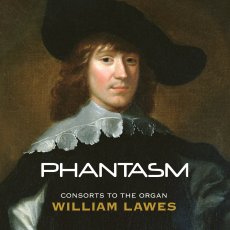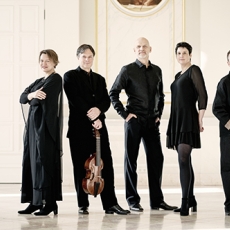Phantasm - Lawes: Consorts to the Organ - Audio Video Club of Atlanta
Poor William Lawes. In a profession that is frequently exposed to attacks by critics but seldom any actual violence, most composers manage to die in their beds. Lawes (1602-1645) was the exception. At a time of civil war, Cavaliers versus Roundheads, he was "Musician in Ordinary for Lutes and Voices" to Charles I. He was given a post in the King's Life Guards to keep him out of danger. But during the route at Rowton Heath, Lawes, ever a curious fellow, stuck his head up once too often and was "casually shot" by a marksman on the other side. If they'd had Prime Minister's Questions in those days, they could have expended their passions in hot air instead of gun powder, and the composer might have lived on to old age.
Lawes continues to inspire controversy to this day. Even the generally conservative article in Wikipedia refers to his "tendency to juxtapose bizarre, spine-tingling themes next to pastoral ones." But Laurence Dreyfus, treble viol and director of the early music consort Phantasm, goes to greater extreme in his assessment of the composer, citing Lawes' "daemonic driving rhythms," his "offensive counterpoint," his suspensions in midair and the rawness of his harmonies. Concerning the Fantasy à 6 (Track 20), Dreyfus' remark is typical: "The competition among the six viols feels pointless until Lawes abruptly calls a halt to the chaos and administers a fatal harmonic shock (at 2:34) which writhes with pain."
Give us a break, Larry Dreyfus. Your Lawes often sounds like a 17th century conflation of Scriabin, Stravinsky and Prokofiev, all on steroids. I will grant you that William Lawes was then in the vanguard of English composers in his forward-looking use of counterpoint and fugue in more than just simple imitation of voices. But his dissonant harmonies may be nothing more than a reflection of the way the way the venerable consorts of viols were tuned in those days, or else the distinctly different way English composers from Byrd to Purcell heard harmonic intervals.
What this does in the case of Lawes is to make his music distinctive and flavorful. As played to perfection by Dreyfus, Wendy Gillespie, Jonathan Manson, Emilia Benjamin, Mikko Perkola, and Markku Luolajan-Mikkola in a consort of pairs of treble, tenor and bass viols, with Daniel Hyde on a euphoniously sympathetic portative organ, the sonic texture exudes a period charm that is never cloying but always a pleasure to hear. In seven "sets" incorporating a variety of fantasias and settings based on venerable plainsong, stately pavans, and lively country dances, and concluding with an "In Nomine," which Lawes quaintly spells "Inominy" (which my churlish spell-checker would have as "Ignominy"), the harmonies are just dissonant enough to be flavorful to a modern ear. I find this music very restful and soothing - spite of Dreyfus' assertions.

